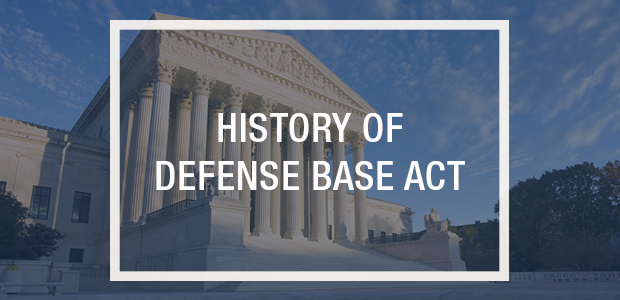History of Defense Base Act
If you are hurt on the job, we are the team that can help you.Barry R. Lerner

The Defense Base Act was enacted by Congress in 1941 as an extension of the Longshore & Harbor Workers Compensation Act. A federal workers’ compensation program, its purpose was to provide workers’ compensation protections for categories of workers who were outside the jurisdiction of other state or federal workers’ compensation systems.
Initially, the Defense Base Act (DBA) was passed to protect workers on lend-lease military bases outside the United States. Even though the U.S. did not officially enter World War II until December 1941 (after the Pearl Harbor attack), at the time of enactment the government was providing military aid and support for the Allies and ultimately 30 countries around the world through this lend-lease program. Once the U.S. entered the war, this use of civilian contractors increased dramatically. Initially, it was thought this legislation would only be necessary for a limited period during World War II. The realities of the modern world proved differently.
Dedicated To You
We are dedicated to making sure you receive the justice you deserve for your case.
Experienced
With over 90 years of collected experience we are able to take on almost any case.
Defense Base Act
There have been several amendments to the Defense Base Act over the years. In 1942, when the War Hazards Act was passed, the DBA was extended to cover payment for injuries due to war risk and provide benefits for captured contractor employees. In 1953, the scope of the DBA was expanded to cover those employed by overseas government construction jobs when there was no declared war. The most significant amendments were enacted in 1958; the temporary legislation was made permanent and the definition of “public works” was expanded to extend DBA coverage to those working abroad under contracts financed by the Mutual Security Act. The Defense Base Act would also now include coverage for non-citizen employees of U.S. contractors and those working for welfare or morale organizations, such as the USO.
The expansion of the definition of “public works” in 1958 was an important one for those working overseas. This now meant if the job involves public improvement, such as building roads or schools or hospitals in another country, financed by the U.S., the employee of the contractor was covered under the Defense Base Act. This meant workers compensation coverage for thousands of employees who previously did not have it.
Fast forward to current times, and the U.S. has increasingly relied on defense contractors for a multitude of tasks in our global efforts. Contracting companies have been asked to take an ever-increasing role in our military activities. Services such as waste disposal and food service, even security tasks, have been provided by contractors in Iraq and Afghanistan. Some contractors have a para-military role, which can be every bit as dangerous as a military assignment.
There is currently a bill introduced in the House of Representative amending the DBA to allow death benefits under the DBA, normally provided to spouse & children, be paid to a designated beneficiary or next of kin. This would avoid forfeiture of those death benefits when one is unmarried and has no children. The issue arose because a security contractor who was killed in the embassy attack in Benghazi, Libya was in just that position – no spouse, no children and thus no death benefits. While well-intentioned, the bill appears to be limited in scope, only addressing war risk hazards such as attacks like the one in Benghazi.


There have been other recent attempts to streamline the workings of the Defense Base Act, such as having the federal government be the self-insurer for the contracting companies, or having a single-payer program in place. While it may seem that change is in the wind, for the time being, the Defense Base Act remains intact, pretty much unchanged since the 1958 amendments.
If you have been injured, or a loved one killed while working overseas, there may be compensation available under the Defense Base Act. The attorneys at Barnett, Lerner, Karsen, Frankel & Castro, P.A. are experienced in Defense Base Act claims, and can help answer your questions.
